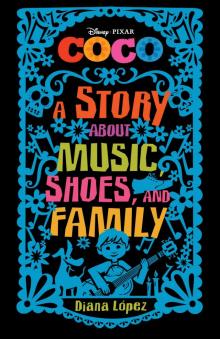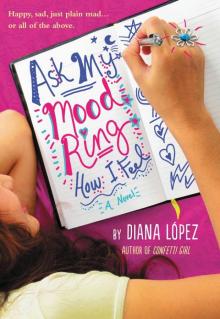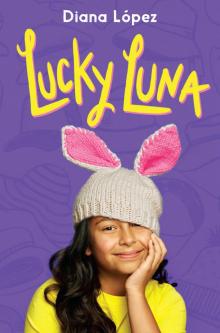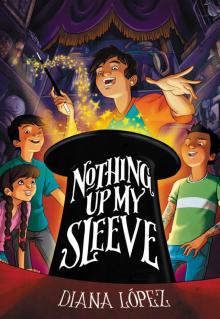- Home
- Diana Lopez
Ask My Mood Ring How I Feel Page 14
Ask My Mood Ring How I Feel Read online
Page 14
She answered anyway. “I’m fine.”
Dad must have heard because he stepped in. I could tell he was still mad. “You are not fine.”
“Maybe not,” Mom said, “but why worry if I don’t have to?”
“What do you mean?” I asked, sensing that something had happened.
Mom sighed. “Last night,” she began, “my arm started to feel funny. It didn’t hurt, but it felt tight, like something inside was pushing against my skin. And when I woke up this morning, it looked like this.”
She pulled down the blanket and showed me.
“Fat arm! Fat arm!” Jimmy laughed as he pointed at Mom. Her right arm was totally bloated. I could see her skin stretched tight like a spandex gym suit. She had no wrist, so her arm looked like a preschool drawing, a puffy rectangle with five sticks for the fingers. “Fat arm! Fat arm!” Jimmy laughed again.
“One more time,” Dad said through clenched teeth, “and I’ll spank you.”
He gave Jimmy the harshest stare-down, and Jimmy’s eyes started to water. I couldn’t blame him for wanting to cry. Dad never got this angry.
“What’s the matter with you?” Mom said to him. “Jimmy’s just making an observation.”
“He’s making fun of you.”
“But he’s only two,” Mom said. “He doesn’t know what he’s saying.”
Jimmy started to sob. I picked him up, and he wrapped his arms around me, putting all his strength into the hug.
“You’re upsetting him,” I scolded. Now I was angry, and I sounded like the parent instead of the kid.
“We’re sorry, mijo,” Mom said to Jimmy. He hid his face in my shoulder, but little by little, he calmed down. “Besides,” Mom added, “I do have a fat arm.” She lifted it and studied it as if it were a separate part of her body. “It looks like an elephant leg. And it’s got these hard cable things under the skin. Come touch it.”
“Lisa,” Dad warned.
“It’s my arm,” she snapped back. “I can’t hide it or pretend it’s normal. Maybe I’m crazy, but I think the way the body reacts is fascinating, too.”
Dad stared at her. Then he stared at her arm. He looked… afraid.
“Don’t fight,” I pleaded.
“We’re not fighting,” Mom assured me. “Sometimes your dad takes things too seriously.”
“And sometimes your mother doesn’t take things seriously enough,” Dad answered. “Like the neighbor. If he weren’t mowing the lawn, you’d be able to rest, and your arm would feel better. I’m sure of it.”
“He has every right to mow his lawn,” Mom said. “I told you to leave him alone, but you talked to him anyway. Now you’re all short-tempered.”
Dad shook his head, too tired to argue. After a few seconds, he stepped out. When he left, Mom seemed sad. I could tell she wanted to fight the sadness just like she had tried to fight sleep a minute ago.
“Don’t worry,” she said. “These are tough times, and we’re all a little anxious.”
That part was definitely true. Lately, my mood ring’s favorite color had been black, for “100 percent stressed out.”
“Come touch my arm,” Mom suggested again.
Jimmy and I poked it. There were hard cables under the skin but the areas between were squishy.
“Does this mean the cancer spread to your arm?” I asked, trying not to sound afraid but unable to keep my voice from trembling.
“No,” Carmen said, walking in with the laptop. She must have been in the other room doing research. She set the computer on the coffee table and studied the screen. “This is a side effect from the treatment. It’s called lymphedema. It happened because Mom’s lymph nodes were damaged, and one of the things they do is drain tissue fluid. It’s like she has a clog in her armpit, so the fluid is all backed up.”
“That’s what it feels like,” Mom said. “It’s very uncomfortable. I already called the doctor, and he wants to see me tomorrow. He said I’ll have to go to physical therapy again.”
“They’re going to massage you and put wraps on you,” Carmen said. “Look.” She showed us pictures of swollen arms and legs being wrapped. Most of them were a lot bigger than Mom’s. “That’s how they get the fluid to move along. But it’ll take several days for the swelling to go down. If you don’t do anything, your arm will just get fatter and fatter.”
“I sure hope this is the last side effect,” Mom said. “I’m already dealing with nausea and fatigue. The arm isn’t so bad as long as something else doesn’t happen. I want to do things again. I feel like I can’t do anything anymore.”
So why was she having these side effects? It made no sense, especially after I’d been working so hard on my promesa. Was it because I wasn’t working fast enough? But what else could I do? I had gone to lots of doors, many of them twice. I had asked all my friends and called my aunts and uncles. Why did I promise five hundred names when I didn’t even know five hundred people?
“Since I can’t lift my arm,” Mom continued, “I won’t be able to go to radiation treatment for a while.”
“Does that mean the cancer’s going to spread?” I sounded more panicky than before.
“I don’t think so,” Mom said, though I could tell she wasn’t exactly sure.
Carmen scrolled down the website and started to read. “It says that lymphedema can happen after surgery and that it occurs on the same side as the mastectomy. That’s exactly what’s happening to you.” Mom nodded. “You’ll have to wear compression bandages to ‘assist with lymphatic flow.’ How cool is that?” She was getting more and more excited, while I was getting more and more butterflies in my stomach. “Can I go to therapy with you?” Carmen asked. “Maybe they’ll let me help. Maybe they’ll teach me how to bandage the arm. That way, I can take care of you at home.”
Mom nodded. “You should be a doctor,” she told Carmen, and my sister smiled as if she had just received the biggest compliment. That’s when I stopped listening to all her medical facts. After all, no one ever told me I could be a doctor. But why would they? You had to be smart for something like that, and I couldn’t even come up with a promesa that was good enough to help Mom.
2,051 PAGES
Monday morning, my hair flipped up in every direction. That’s what I got for going to bed right after taking a shower. I didn’t want to go to school looking so awful, so I tried leave-in conditioner, the straightening iron, and even wetting my hair and blow-drying it, section by section, just like a professional stylist. But my hair was as uncooperative as Jimmy when he needed to go in his car seat. So I grabbed a rubber band, made a ponytail, and slipped on a T-shirt that said “Bad hare day” over a picture of bunnies in striped prison uniforms.
Then I went to school, excited about seeing Derek in math. He was still at the top of my Boyfriend Wish List, but before I had a chance to talk to him, Mr. Leyva called me to his desk. School hadn’t officially started, so the room was mostly empty. He said, “I’m glad you came early, so we could talk about your test.”
My whole body slumped. “I failed, didn’t I?”
“Now, now,” he said, as if calming a baby. “If you knew you were struggling, why didn’t you ask your sister for help? Sometimes students learn better from their peers, and you’ve got the best math student right there in your house. I’m sure she’d be happy to tutor you.”
I looked up at him, wishing my stare could zap him like a stun gun.
He must have seen how angry I was because he said, “It’s just an idea.”
“A bad idea,” I grumbled.
Mr. Leyva studied me a moment, to figure me out, I guess. After a while, he said, “Well, you didn’t complete the test, so at this point, you haven’t technically failed.”
He showed me my paper. Some of the answers were wrong, but others were correct. Mr. Leyva explained how I was “on the bubble,” and how, if I got the remaining questions right, I could pass. “Go to the library,” he said, “and complete the test. Take the entire hour if necessary and remember to sh
ow all your work.”
I felt so grateful for the chance to complete the missing questions. Maybe a bad hair day didn’t have to mean a bad math day, too. I wanted to salute Mr. Leyva and say, “Sir, yes, sir.” After all, I felt like a soldier going to war against math. Maybe this time, I’d be victorious.
I gladly took the test and headed to the library, getting there just as the tardy bell rang. Since classes were scheduled for visits, the librarian let me use her office. “Make yourself comfortable,” she said.
So I did. I pushed aside her papers to clear a spot. Then I readjusted the height and the armrests of her chair, took a pencil from a cup on her desk, and turned up her radio. To loosen up, I popped my knuckles and did a few neck stretches. Time for battle, I told myself. Math is your foe, but it can be conquered.
The first problem went like this: Mary went to the store to buy a dress. The price of the dress is $40, but a sign announces that the store is offering a 20 percent discount. How much will Mary pay?
How was I supposed to know the answer? This was the most ridiculous problem on the planet. First, what store was this? Because stores like Macy’s had sales all the time with big red signs that said “20% off.” But it was never that simple since the small print always began with “discount does not apply to…” How could I know if the discount applied to Mary’s dress when the problem didn’t list the exceptions? Second, when was Mary buying the dress and what kind of dress was it? What if the sale was happening right now, in the fall? What if the dress was a sundress? Would Mary really buy something she couldn’t wear for the next six months? Next, what condition was the dress in? Sometimes the clothes on sale were stained or missing a button, which meant Mary could argue for a bigger discount. That’s what Mom did. She always got a few dollars taken off. Finally, how much money did Mary have? Did her parents expect her to pay for the whole thing or did they plan to pitch in? Did Mary even have parents, or was she an adult with a job?
I couldn’t stop fretting over the question. How could the word problem ignore such important details? This had to be a trick. I tapped the pencil on the desk, wondering what to do. “Need more information,” I wrote beside the word problem. Then I saw in bold print, “Show all your work.” Suddenly, I understood. Mr. Leyva wanted me to explain what kind of information I needed. I grabbed a sheet of notebook paper since there wasn’t enough room to explain on the test. I wrote down everything that might affect the price of the dress—the store, the small print on the ad, the style, the condition, the season, and even Mary’s personal situation.
The remaining questions were similar, so I wrote “Need more information” again and again, explaining why each time. My hand got so stiff from all that writing, but passing the test was worth the pain. After forty minutes, I was done.
I put the librarian’s supplies back in order and headed to the circulation desk to say thanks, but then I spotted Carmen. I didn’t want her to know about my math test, and I didn’t want to talk to her, especially in front of a cute guy like Joe Leal, who was checking out the display of graphic novels. Sure, everyone knew Carmen and I were sisters, that she was a genius while I was not a genius. But if they didn’t see us together, maybe they’d forget. So I hid behind the office door, and while I waited for a moment to escape, I spied.
As usual, Carmen had on her prep school uniform with its plaid skirt, knee-high socks, and blazer, and, as usual, she carried a stack of books that was as tall as Jimmy. The books were about to topple over, so as she walked, she swayed like a circus clown on a tightrope. Carmen approached a table, but the students there laughed and waved her away. She approached another table, but one of the girls threw a purse on the last empty chair and said, “We’re saving this.” When she approached a third table, a guy shook his head as if to say, “Don’t even try it.” So Carmen lugged her books to the counter. She wasn’t far from me, but luckily, she faced the other way. I should have said hello because part of me felt sorry for her, but another part felt like telling her, “That’s what you get for being Little Miss Factoid all the time and making me feel like a dummy.” Okay, so maybe I was a dummy because I needed extra time on my math test, but at least I had friends.
Carmen went directly to the last page of each book and wrote something on a piece of paper. She had just finished going through the stack when her teacher approached.
“What you got there?” she asked Carmen, who answered by reading out titles: When a Parent Has Cancer; Is Pollution Making Us Sick?; Breast Cancer: What Every Teen Girl Should Know; The Disease Sourcebook; Cancer Treatments and Their Side Effects; and The Complete Medical Guide for Teens.
“That’s a lot of reading,” the teacher said.
Carmen shrugged it off. Then she read out the numbers she’d written down. “It’s 54 plus 212 plus 340 plus 298 plus 424 plus 723 for a total of 2,051 pages. If I get to keep these books for two weeks, that’s 146.5 pages a day minus the pictures and glossaries and tables of contents and indexes.” She glanced at the book spines again. “These books are okay,” she said, “but they’re written for teens. This”—she held up the thinnest book—“has pictures. Not photographs of tumors or blood cells, but illustrations like the kind in a kid book. What do the doctors read? That’s what I want to know because I want to be a doctor when I grow up.”
“You’ll have to visit a university or hospital library for doctor books,” the teacher said. “They’re very technical.”
“I know, but I don’t mind reading technical stuff if it gives me the real answers.”
“I don’t think anyone has the real answer for cancer. But I’m sure the medical books are more detailed than these.”
“That’s what I want,” Carmen said, “details.”
The teacher patted her shoulder. “Why don’t you start simple, okay, sweetie?”
Carmen nodded, then took the books to the checkout line. While she was busy with the librarian, I slipped out without letting her know I’d been there.
Later at home, Mom showed us her compression dressings. She was wrapped from armpit to hand. Carmen, Jimmy, and I couldn’t help touching the bandages.
“You look like a mummy,” I said.
She laughed. “Mummy, Mommy, not much difference.”
“You should have taken me with you,” Carmen said. “I really wanted to learn.”
“You learn more in school, mija.”
“No, I don’t. I have to draw pictures.” She reached in her backpack and pulled out pages of lines looping over themselves, forming odd shapes that she had colored in. “I finish my work before everyone else, so this is what I do. I try reading, but…”
“But what?” Mom wanted to know.
Carmen glanced at me. She probably didn’t want to admit how nerdy she was. “Nothing,” she said.
“She doesn’t read because she’s too embarrassed,” I guessed aloud. “She doesn’t have any friends.”
“I have friends,” Carmen said, all offended.
“Name one.”
She crossed her arms. “No, because you don’t know them.”
“I don’t know them because they don’t exist.”
She stared at me. If her eyes were boxing gloves, I’d be knocked out by now. That’s how angry she looked.
“That’s enough,” Mom said. “Carmen, go outside and water the plants for me. I’m not supposed to get my wraps wet. And Chia, get the towels from the dryer and fold them.”
“You’re giving us chores?” Carmen whined.
“About time you helped out,” I said as I headed to the laundry room.
After I folded towels, I noticed that the furniture in the living room needed dusting, and the Chia Pets needed watering, and Jimmy’s toys needed to be put away. When Dad came home, I helped him with dinner, migas again, even though it was my night to clean the kitchen. Then I bathed Jimmy and read him a bedtime story so he could go to sleep. Finally, at about eight thirty, I had time for homework. By then, my feet throbbed and my back ached as if I’d b
een standing all day. I had trouble concentrating, not because I felt distracted but because I had a headache, probably from stress. I shouldn’t be doing homework this late. I should be watching TV or chatting with my friends on Skype. I should be sleeping!
My cell phone rang. Shawntae. When I answered, she was all panicky.
“Erica, you have to help me. I’m in so much trouble.”
My mind raced. Were her parents in an accident? Did her house burn down? Did she humiliate herself in front of one of the guys on our Boyfriend Wish List?
“What happened?” I asked, fearing the worst.
“I ran out of ink!” she cried.
I sighed, and even though she couldn’t see me, I rolled my eyes. That girl had more drama than a reality show.
“Can you help me, pleeeaase?”
“Sure,” I said. “What do you need?”
“I’m forwarding a file for my social studies class. Can you make fifty copies? It’s an invitation to a presentation about the election. I’ll buy you a new ink cartridge if you do this giant favor.”
“Of course, I’ll do it. No problem.”
“I knew I could count on you,” she said.
A few minutes later, she e-mailed the file. I made sure my printer had enough paper and asked it to print. Maybe now I could do my own homework and finally get some sleep. But when I pulled Shawntae’s invitations from the printer, I noticed that they weren’t flyers, but cards, which meant they had to be folded. More work! But what could I do? I already told Shawntae I’d take them to school tomorrow.
So I started folding, trying my best to get the lines straight because if Shawntae were doing this, she’d get them straight. She was a perfectionist. Never a hair out of place or a shoe that didn’t exactly match her outfit.
When I was about halfway through, Carmen walked in. “Still doing homework?” she said as if I were too dumb to get it done in time. I ignored her, kept on folding, and realized that I was getting tired. There was no way I’d be able to concentrate on my own assignments.
Carmen got into bed. After a minute, she sat up. “Do you think Mom’s going to be okay?” she asked.

 Coco Middle Grade Novel
Coco Middle Grade Novel Ask My Mood Ring How I Feel
Ask My Mood Ring How I Feel Choke
Choke Confetti Girl
Confetti Girl Lucky Luna
Lucky Luna Nothing Up My Sleeve
Nothing Up My Sleeve